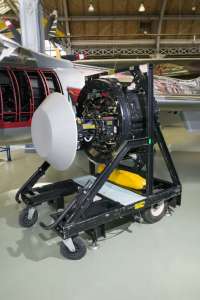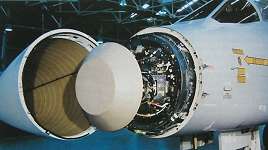Foxhunter
Description of the radar set, tactical-technical characteristics

Figure 1: AI-24 Foxhunter air interception radar, as fitted to BAe Tornado F3 interceptors
(© The Board of Trustees of the Science Museum, licensed: CC-BY-NC-SA 4.0)

Figure 1: AI-24 Foxhunter air interception radar, as fitted to BAe Tornado F3 interceptors
(© The Board of Trustees of the Science Museum, licensed:
CC-BY-NC-SA 4.0)
| Specifications | |
|---|---|
| frequency: | X-Band |
| pulse repetition time (PRT): | |
| pulse repetition frequency (PRF): | |
| pulsewidth (τ): | |
| receive time: | |
| dead time: | |
| peak power: | |
| average power: | |
| instrumented range: | 185 km |
| range resolution: | |
| accuracy: | |
| beamwidth: | |
| hits per scan: | |
| antenna rotation: | |
| MTBCF: | |
| MTTR: | |
Foxhunter
The AI-24 Foxhunter is a multimode X-Band pulse-Doppler radar system optimized for Airborne Interception (AI). Its primary mode is a pulse-Doppler technique known as Frequency Modulated Interrupted Continuous Wave (FMICW). The radar is fitted with a Cassegrain-Antenna that is mechanically stabilized by a hydraulic drive. The Foxhunter airborne interception (AI) radar is compatible with the size and weight limits of the air defence variant of the Tornado.
The radar's traveling wave tube transmitter has been designed with the inherent flexibilty to handle the differing waveforms used in the various modes of operation. The receiver uses two separate IF amplifiers; one for FMICW modes and one for pulse modes, as the optimal characteristics of each mode were impossible to accommodate in a single device. The pulse radar modes use Surface Acoustic Wave filters (SAW) for intrapulse modulation and pulsecompression. FMICW modes use FM modulation of the waveform for ranging.

